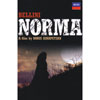Bellini Norma
Norma nullified - and with all the best intentions in the world
View record and artist detailsRecord and Artist Details
Composer or Director: Vincenzo Bellini
Genre:
DVD
Label: Decca
Magazine Review Date: 2/2007
Media Format: Digital Versatile Disc
Media Runtime: 120
Mastering:
Stereo
Catalogue Number: 074 3147DH

Tracks:
| Composition | Artist Credit |
|---|---|
| Norma |
Vincenzo Bellini, Composer
Alla Avetisian, Clotilde, Mezzo soprano Armenian State Opera Chorus Armenian State Opera Orchestra Gegam Grigorian, Pollione, Tenor Hasmik Papian, Norma, Soprano Karen Lavchian, Conductor Mikhail Ovakimian, Oroveso, Bass Vardouhi Khachatrian, Adalgisa, Soprano Varuzhan Martirosian, Flavio, Tenor Vincenzo Bellini, Composer |
Author: John Steane
They do not come much worse than this, or at least so we must most fervently hope. But the truly terrible thing is that it has clearly involved so much sincere intention, so much time, effort, ability and, no doubt, expenditure. As announced prominently on the box-cover, label and booklet, it is “a film by Boris Airapetian”, “a dramatic feature film of Bellini's operatic masterpiece” and “shot entirely on location in the spectacular Roman ruins in the Caucasus”. Airapetian is an Armenian film director who as a young man saw Caballé in Norma at the Bolshoi. It impressed him deeply and 20 years later he produced the opera at the Armenian State Opera House. He then became obsessed with the notion that if a film could be made the masterpiece could reach a new and wider public. So far so good.
The opportunity opening to him, a thousand ideas germinated. It must be a film and not a filming of his stage production, but it must retain something of the stage, too, so we see the curtains close and some of the props are clearly of the theatre. It must be filmed to give the music due priority, but thunder and lightning may interrupt for dramatic effect, and all handy visual distractions may be introduced also. The focus of the film is to be the main characters, their actions and emotions; but the camera is free to wander down corridors, look through squint-holes or slip out into the open air (while the characters are singing indoors) to admire the view or watch a flight of birds. The singers are to act naturally and not “operatically”, but this seems to have been so impressed upon them that for much of the time their faces remain completely blank. And that is only the beginning of the confusion and misguided effort.
The chorus, physically very active, show the blankest faces of all. The Adalgisa has two expressions, one for happiness, another for the rest; as a singer she seems technically able but to develop a rather reedy tone. The Pollione is Armenia's veteran operatic hero, Gegam Grigorian, possessor of a remarkable voice well suited to his music, but unprepossessing in appearance and inexpressive in his acting. The Norma, Hasmik Papian, has moments when she feels able to act, and her singing is good enough to make one wish the production encouraged one to listen as attentively as she deserves. She seems to be fated to suffer from distracting producers: she was the Norma of the Amsterdam production reviewed by Patrick O'Connor (Opus Arte, 11/06), in which the singers were shown in real, modern life to be both in love with the tenor. My notion that “they do not come much worse than this” was perhaps optimistic.
The opportunity opening to him, a thousand ideas germinated. It must be a film and not a filming of his stage production, but it must retain something of the stage, too, so we see the curtains close and some of the props are clearly of the theatre. It must be filmed to give the music due priority, but thunder and lightning may interrupt for dramatic effect, and all handy visual distractions may be introduced also. The focus of the film is to be the main characters, their actions and emotions; but the camera is free to wander down corridors, look through squint-holes or slip out into the open air (while the characters are singing indoors) to admire the view or watch a flight of birds. The singers are to act naturally and not “operatically”, but this seems to have been so impressed upon them that for much of the time their faces remain completely blank. And that is only the beginning of the confusion and misguided effort.
The chorus, physically very active, show the blankest faces of all. The Adalgisa has two expressions, one for happiness, another for the rest; as a singer she seems technically able but to develop a rather reedy tone. The Pollione is Armenia's veteran operatic hero, Gegam Grigorian, possessor of a remarkable voice well suited to his music, but unprepossessing in appearance and inexpressive in his acting. The Norma, Hasmik Papian, has moments when she feels able to act, and her singing is good enough to make one wish the production encouraged one to listen as attentively as she deserves. She seems to be fated to suffer from distracting producers: she was the Norma of the Amsterdam production reviewed by Patrick O'Connor (Opus Arte, 11/06), in which the singers were shown in real, modern life to be both in love with the tenor. My notion that “they do not come much worse than this” was perhaps optimistic.
Discover the world's largest classical music catalogue with Presto Music.

Gramophone Digital Club
- Digital Edition
- Digital Archive
- Reviews Database
- Full website access
From £8.75 / month
Subscribe
Gramophone Full Club
- Print Edition
- Digital Edition
- Digital Archive
- Reviews Database
- Full website access
From £11.00 / month
Subscribe
If you are a library, university or other organisation that would be interested in an institutional subscription to Gramophone please click here for further information.




